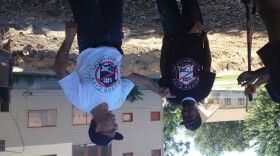The human costs of Detroit’s bankruptcy are revealing themselves as the case proceeds in court.
For Dwayne Provience, it means yet more uncertainty over an already years-long wrongful imprisonment lawsuit.
When a city files for Chapter 9 municipal bankruptcy, all its lawsuits get put on hold. That’s a good thing for the city, as it struggles to conserve cash and get its financial house in order.
But it’s a bad thing for people like Provience. Now, he’s just one of thousands of creditors waiting to see how this bankruptcy shakes out.
“It was kind of a blow to me, because I was hoping to put this part of my situation behind me,” Provience says of the bankruptcy.
Provience spent nearly 10 years in prison for a 2000 murder in Detroit. He was exonerated in 2010, with legal help from the University of Michigan's Innocence Clinic. Soon after, he filed a federal lawsuit against the city of Detroit for wrongful arrest, malicious prosecution, and due process violations.
A mediator awarded Provience a $5 million settlement. But the city objected, the case bounced around the courts, and now it’s on hold indefinitely. And like Detroit’s other creditors, he may have to take just a small fraction of whatever he might be awarded.
Though it’s uncertain when the case would have been resolved anyway, Provience says the bankruptcy could draw out the process by “months or years. It’s in limbo right now.”
Provience had hoped to settle with the city soon, because he has two children in college. “I wanted to do something for them, to make sure that college was paid for, so they wouldn’t have to be struggling,” he says.
But Provience—who works now as a personal trainer, and is study to become a physical therapy assistant—says he’s willing to wait it out, because a resolution might be the closest he ever comes to getting an apology.





